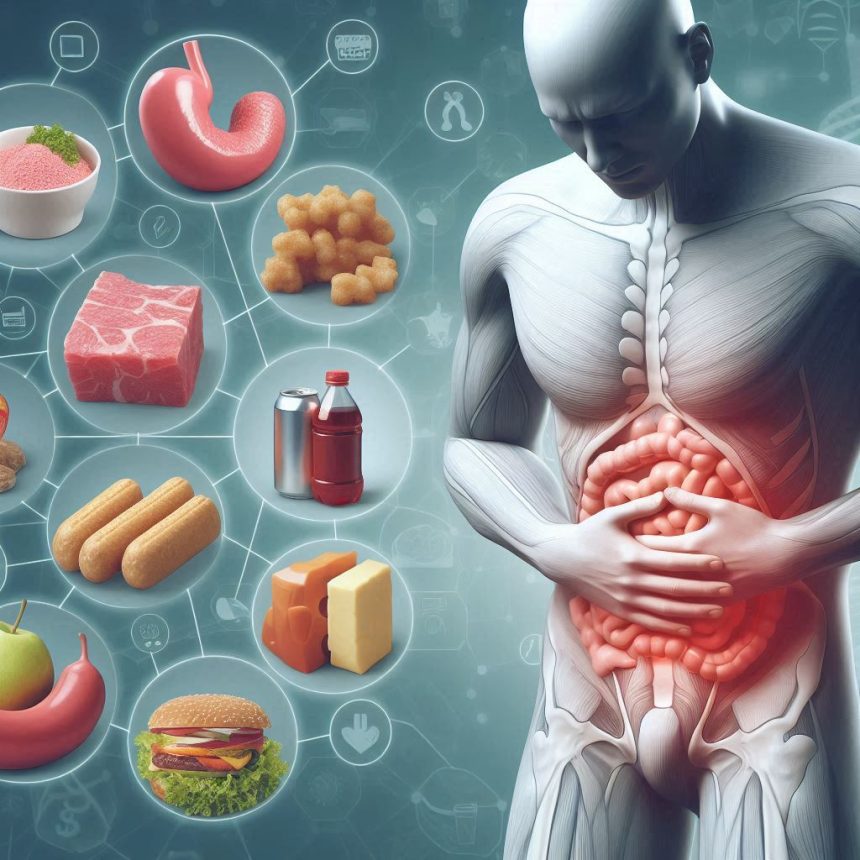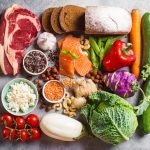Did you know that over 70 million people in the United States struggle with digestive diseases? Many of these health issues come from poor eating habits. Your gut health plays a vital role in your well-being since it hosts trillions of bacteria that impact digestion, immunity, and even your mood. However, not all foods support this delicate ecosystem. In fact, some foods can harm your gut, leading to discomfort and long-term problems. In this article, we’ll dive into the five worst foods for your gut health and discuss what you should eat instead to promote a healthy digestive system.
Processed Foods and Artificial Additives: A Recipe for Gut Trouble
Processed foods are notorious for containing chemicals, preservatives, and emulsifiers that damage gut health.
For example, artificial preservatives like nitrates and sulfites often extend the shelf life of processed foods. However, these chemicals disrupt the gut microbiome, causing inflammation and increasing the risk of leaky gut syndrome.
How Processed Foods Harm Your Gut
Leaky gut syndrome weakens the intestinal barrier, allowing toxins and harmful bacteria to enter the bloodstream. This triggers the immune system, which can lead to chronic inflammation. The impact goes beyond digestion and may even contribute to autoimmune disorders. Emulsifiers in processed foods, which improve texture and shelf life, further damage the gut.
Research published in Nature shows emulsifiers disrupt the mucus layer that protects the gut lining. Without this layer, harmful bacteria can easily invade the gut wall, leading to inflammation and an increased risk of Crohn’s disease, obesity, and type 2 diabetes.
High-Sugar Foods and Beverages: Sweet But Dangerous for Your Gut
High-sugar foods and beverages pack refined sugars like fructose and glucose, which damage your gut microbiome.
When you consume large amounts of sugar, it feeds harmful gut bacteria and yeast, like Candida. This overgrowth throws off the balance of your gut bacteria, a condition known as dysbiosis.
How Sugar Harms Digestive Health
Dysbiosis leads to a reduction in the number of beneficial bacteria essential for digestion and immune function.
Over time, this imbalance can cause digestive problems such as bloating, gas, and constipation. Even more concerning, long-term dysbiosis has been linked to more severe conditions like irritable bowel syndrome (IBS) and inflammatory bowel disease (IBD).
Studies also show that poor gut health may contribute to obesity. Harmful gut bacteria can alter how your body stores fat and regulates hunger, increasing calorie absorption and leading to weight gain.
Fried and Fatty Foods: A Gut Health Disaster
Fried and fatty foods contain unhealthy fats, such as trans fats and saturated fats, which can harm your gut. Trans fats, often added to foods to extend shelf life, cause inflammation in the gut lining. This inflammation weakens the gut’s barrier function, which allows toxins, bacteria, and partially digested food particles to enter the bloodstream.
As a result, your body experiences widespread inflammation and immune responses.
The Destructive Impact of Saturated Fats
Saturated fats, commonly found in fried foods, also damage gut health. High amounts of saturated fats increase bile acid production in the gut, which, in excess, irritates the gut lining. This irritation fosters the growth of harmful bacteria that produce toxic byproducts.
Over time, these byproducts worsen gut inflammation and increase the likelihood of developing gastrointestinal conditions, such as inflammatory bowel disease.
Artificial Sweeteners: Not as Innocent as They Seem
Although artificial sweeteners seem like a healthier alternative to sugar, they can disrupt gut health. Sweeteners such as aspartame, sucralose, and saccharin are commonly used in diet sodas, sugar-free snacks, and low-calorie desserts.
However, instead of being absorbed in the upper gastrointestinal tract, these sweeteners reach the colon, where they affect gut bacteria.
How Artificial Sweeteners Impact Gut Health
Artificial sweeteners promote the growth of harmful bacteria and reduce the presence of beneficial strains. This leads to dysbiosis, which causes digestive problems like bloating, gas, and IBS.
Research from PubMed also shows that artificial sweeteners weaken the gut barrier, increasing the risk of leaky gut syndrome. Once the gut barrier is compromised, toxins and harmful substances can enter the bloodstream, leading to more severe health problems.
Red and Processed Meats: Inflammatory Foods to Avoid
Red and processed meats, like bacon, sausages, and hot dogs, are high in saturated fats that promote inflammation in the gut.
Studies published in Science Direct reveal that diets rich in saturated fats encourage the growth of harmful bacteria, such as Bilophila wadsworthia. This bacterium thrives in an inflamed gut, which leads to a state of chronic inflammation and gut damage.
Nitrates and Nitrites: Hidden Risks in Processed Meats
Processed meats also contain nitrates and nitrites, which help preserve meat and enhance its flavor. When consumed, your body converts these compounds into harmful substances that inflame the cells lining your gut. This inflammation damages the gut barrier, leading to constipation, bloating, and even more serious problems like gastrointestinal cancers.
The Best Foods for Gut Health
While avoiding harmful foods is essential, you should also focus on eating foods that support a healthy gut microbiome. Let’s take a look at five of the best foods for promoting gut health.
Yogurt: A Probiotic Powerhouse
Yogurt is one of the best foods for gut health due to its rich probiotic content. Probiotics are live bacteria that help restore balance to the gut microbiome by boosting the population of beneficial bacteria. These good bacteria crowd out harmful strains, reducing the risk of digestive issues like bloating, constipation, and diarrhea.
How Yogurt Supports the Gut Lining
In addition to its probiotic content, yogurt is rich in calcium, which helps maintain the strength of the gut lining. The gut lining acts as a barrier, preventing harmful substances from entering the bloodstream. By keeping this barrier intact, yogurt supports better nutrient absorption and enhances overall digestive health.
Kimchi: A Fermented Gut Booster
Kimchi, a traditional Korean fermented food, is packed with probiotics and fiber. The fermentation process introduces beneficial bacteria into the food, helping to restore and maintain a balanced gut microbiome.
The Importance of Fiber in Kimchi
Kimchi is rich in dietary fiber, which acts as a prebiotic, feeding the beneficial bacteria in your gut and encouraging their growth. Fiber also adds bulk to stool, promoting regular bowel movements and preventing constipation. Roughly half a cup of kimchi daily provides essential probiotics and fiber for a healthy gut.
Bananas: Potassium and Fiber for Gut Health
Bananas are one of the best foods for gut health due to their high fiber content, particularly resistant starch. Resistant starch acts as a prebiotic, feeding beneficial gut bacteria. In addition to fiber, bananas contain potassium, which helps regulate fluid balance in the digestive system.
Bananas and Digestive Health
The fiber and potassium in bananas work together to promote regular bowel movements, prevent bloating, and support a balanced gut environment. Eating one medium banana daily helps keep your gut healthy.
Oats: A Soluble Fiber Powerhouse
Oats are an excellent source of beta-glucan, a type of soluble fiber that promotes gut health. Beta-glucan forms a gel-like substance in the digestive tract, which slows digestion, allowing for better nutrient absorption.
Oats and the Gut Microbiome
Beta-glucan serves as food for beneficial gut bacteria, helping to maintain a balanced microbiome. Oats also add bulk to stool, preventing constipation and supporting regular bowel movements. Eating 40 grams of dry oats each day can significantly improve your gut health.
Garlic: A Natural Prebiotic
Garlic is a rich source of prebiotic fibers, particularly inulin, which feeds beneficial bacteria in the gut. Prebiotics play a critical role in promoting a healthy gut microbiome by stimulating the growth of good bacteria.
Garlic’s Antimicrobial Properties
In addition to being a prebiotic, garlic contains allicin, a sulfur compound with strong antimicrobial properties. Allicin helps protect the gut from harmful bacteria, allowing beneficial bacteria to thrive. Consuming one to two cloves of garlic daily supports a diverse and healthy gut microbiome.
Final Thoughts: Protect Your Gut Health
Avoiding harmful foods such as processed meats, high-sugar snacks, and fried foods is essential for maintaining gut health.
Instead, focus on eating whole foods rich in probiotics and prebiotics, such as yogurt, kimchi, and garlic. By making these mindful dietary choices, you can protect your gut, improve digestion, and boost your overall well-being.
Disclaimer: Remember, moderation is key, and it’s always best to consult with a healthcare professional before making any significant dietary changes.









